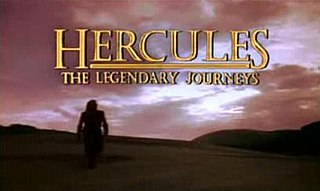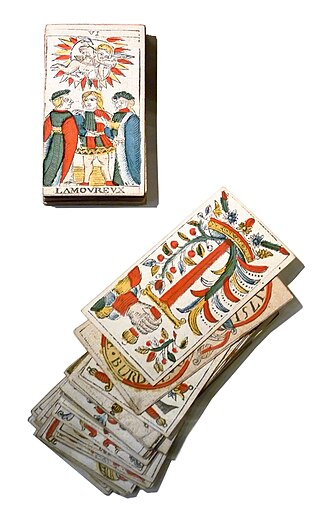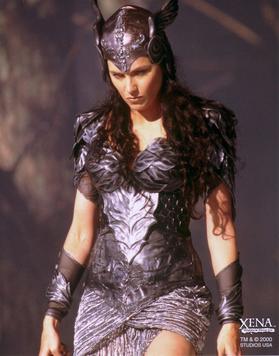
Xena is a fictional character from the Xena: Warrior Princess franchise, portrayed by New Zealand actress Lucy Lawless and co-created by Robert Tapert and John Schulian. She first appeared as a villain in the 1995–1999 television series Hercules: The Legendary Journeys before joining forces with Hercules. Xena was popular with fans, so the producers decided to create a spin-off with the character in the starring role. She later appeared in the subsequent comic book of the same name, as well as the spin-off animated film The Battle for Mount Olympus, and non-canon expanded universe material, such as books and video games.

Xena: Warrior Princess is an American fantasy television series filmed in New Zealand, which aired in first-run syndication from September 4, 1995, to June 18, 2001.

Hercules: The Legendary Journeys is an American fantasy television series filmed in New Zealand, based on the tales of the classical Greek culture hero Heracles. Starring Kevin Sorbo as Hercules and Michael Hurst as Iolaus, it was produced from January 16, 1995, to November 22, 1999. It ran for six seasons, producing action figures and other memorabilia as it became one of the highest-rated syndicated television shows in the world at that time. It has aired on Once Channel, Sky1, five/5, Heroes & Icons, and Horror.

The Rider–Waite Tarot is a widely popular deck for tarot card reading, first published by the Rider Company in 1909, based on the instructions of academic and mystic A. E. Waite and illustrated by Pamela Colman Smith, both members of the Hermetic Order of the Golden Dawn. Also known as the Waite–Smith, Rider–Waite–Smith, or Rider Tarot, the deck has been published in numerous editions and inspired a wide array of variants and imitations. Estimates suggest over 100 million copies of the deck circulate across 20 countries.

Death (XIII) is the 13th trump or Major Arcana card in most traditional tarot decks. It is used in tarot card games as well as in divination. The card typically depicts the Grim Reaper, and when used for divination is often interpreted as signifying major changes in a person's life.

Pamela Colman Smith, nicknamed "Pixie", was a British artist, illustrator, writer, publisher, and occultist. She is best-known for illustrating the Rider–Waite tarot deck for Arthur Edward Waite. This tarot deck became the standard among tarot card readers, and remains the most widely used today. Smith also illustrated over 20 books, wrote two collections of Jamaican folklore, edited two magazines, and ran the Green Sheaf Press, a small press focused on women writers.

Lucille Frances Lawless is a New Zealand actress and director. She is best known for her roles as Xena in the television series Xena: Warrior Princess, as D'Anna Biers on the re-imagined Battlestar Galactica series, and Lucretia in the television series Spartacus: Blood and Sand and associated series. Since 2019, she has starred as Alexa in the television series My Life Is Murder.

Gabrielle is a fictional character played by Renee O'Connor in the American fantasy TV series Xena: Warrior Princess (1995–2001). She is referred to by fans as the Battling Bard of Potidaea. Her trademark weapons are the Amazon fighting staff and later, the sais. She was also an Amazon Princess and later an Amazon Queen. The character's development and progression is a story that spans the entire show's run, with her first appearance in "Sins of the Past" seeing her as a naive farm girl, and the final episode, "A Friend In Need ", seeing her as a fully formed but rational warrior, set to follow in Xena's footsteps.

Playing cards have been in Italy since the late 14th century. Until the mid 19th century, Italy was composed of many smaller independent states which led to the development of various regional patterns of playing cards; "Italian suited cards" normally only refer to cards originating from northeastern Italy around the former Republic of Venice, which are largely confined to northern Italy, parts of Switzerland, Dalmatia and southern Montenegro. Other parts of Italy traditionally use traditional local variants of Spanish suits, French suits or German suits.

The Tower (XVI) (most common modern name) is the 16th trump or Major Arcana card in most Italian-suited tarot decks. It has been used in tarot cards since the 15th century as well as in divination since the mid-19th century.
The BOTA Tarot was created by Paul Foster Case, founder of Builders of the Adytum (BOTA), and artist Jessie Burns Parke. Although it is based upon, and closely resembles, Arthur Edward Waite's 1909 Rider-Waite deck, Case changed what he said were mistakes or "blinds" on the part of Waite. The BOTA Tarot is available as a standard-sized deck and a larger version containing only the Major Arcana in black and white, as Case believed that every student must color in their own deck. After his death, the Major Arcana became also available in color. Each of these cards has a border of a particular color associated with that according to Case. The Minor Arcana cards are illustrated with suit symbols only.

Paul Foster Case was an American occultist, Freemason, and writer of books on occult tarot and Qabalah. Perhaps his greatest contributions to the field of occultism were the lessons he wrote for associate members of Builders of the Adytum or B.O.T.A. The knowledge lectures given to initiated members of the chapters of the B.O.T.A. were equally profound, although the limited distribution has made them less well known.

The Tarot of Marseilles is a standard pattern of Italian-suited tarot pack with 78 cards that was very popular in France in the 17th and 18th centuries for playing tarot card games and is still produced today. It was probably created in Milan before spreading to much of France, Switzerland and Northern Italy. The name is sometimes spelt Tarot of Marseille, but the name recommended by the International Playing-Card Society is Tarot de Marseille, although it accepts the two English names as alternatives. It was the pack which led to the occult use of tarot cards, although today dedicated decks are produced for this purpose.
Xena: Warrior Princess has been referred to as a pop cultural phenomenon and feminist and lesbian icon. The television series, which employed pop culture references as a frequent humorous device, has itself become a frequent pop culture reference in video games, comics and television shows, and has been frequently parodied and spoofed.

"Girls Just Wanna Have Fun" is the fourth episode of the second season of the syndicated television series Xena: Warrior Princess. The 28th episode of the series overall, the episode was written by Adam Armus and Nora Kay Foster, was directed by T.J. Scott, and first aired on October 21, 1996. Girls Just Wanna Have Fun is also the title of a multipath adventure game by Slingshot Entertainment which is based upon this episode.

The first season of the television series Xena: Warrior Princess commenced airing in the United States and Canada on September 4, 1995, concluded on July 29, 1996, and contained 24 episodes. It introduces Gabrielle, the series co-star, beside Xena, previously a secondary character in the TV series Hercules: The Legendary Journeys. Gabrielle becomes Xena's greatest ally; her initial naiveté helps to balance Xena and assists her in recognizing and pursuing the "greater good."

Tarot card reading is a form of cartomancy whereby practitioners use tarot cards to purportedly gain insight into the past, present or future. They formulate a question, then draw cards to interpret them for this end. A traditional tarot deck consists of 78 cards, which can be split into two groups, the Major Arcana and Minor Arcana. French-suited playing cards can also be used; as can any card system with suits assigned to identifiable elements.

"The Rheingold" is the seventh episode of the sixth season of the American fantasy television series Xena: Warrior Princess, and the 119th episode overall. The episode was written by R. J. Stewart and directed by John Fawcett; it first aired on November 13, 2000. The series, set in Ancient Greece, focuses on Xena, a ruthless warrior seeking redemption for her past actions. Throughout her adventures, she is accompanied by her best friend & soulmate Gabrielle, who assists her in recognizing and pursuing the greater good.

U.S. Games Systems, Inc. (USGS) is a publisher of playing cards, tarot cards, and games located in Stamford, Connecticut. Founded in 1968 by Stuart R. Kaplan, it has published hundreds of different card sets, and about 20 new titles are released annually. The company's product line includes children's card games, museum products, educational cards, motivational cards, tarot cards, and fortune telling decks. These are marketed through a network of retailers, including bookstores, museum gift shops, metaphysical shops, greeting card stores; toy and game stores; hobby shops, and mail order catalogs.

















